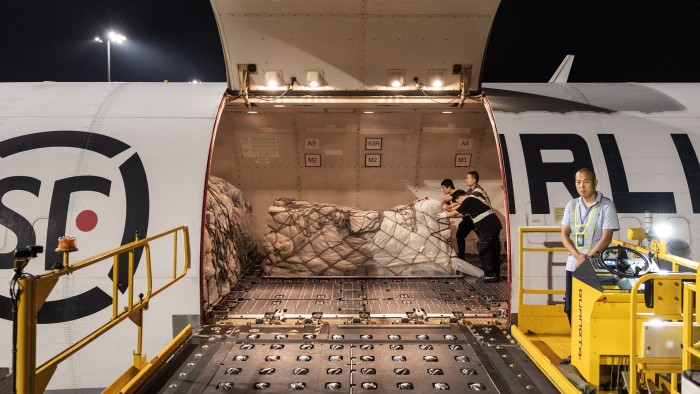Stay informed with free updates
Simply sign up to the Airlines myFT Digest — delivered directly to your inbox.
Air freight groups and airlines, which only recently cut flights to China amid weak tourist demand, are scrambling to reroute planes and cash in on elevated freight rates out of the country ahead of Black Friday and the Christmas shopping season.
Strong growth in demand for cheap online goods from Chinese ecommerce groups and the rising use of air freight amid disruption in the Red Sea are threatening to overwhelm the already strained rapid delivery market before Christmas, causing air freight rates to jump.
The freight rate for flying goods from Asia to the US has surged, with the average spot price in October up 49 per cent from a year ago to $5.46 a kilogram, according to market analytics firm Xeneta. Rates from Asia to Europe rose 25 per cent over the same period.
The jump in air freight demand comes as China-founded ecommerce groups respond to western consumers’ appetite for cheap goods. Many of their shipments are sent direct to consumers by air, taking advantage of import duty exemptions on shipments below a certain price.
US and EU lawmakers are looking to clamp down on the flow of imports from China using this duty “loophole”, with the White House proposing to exclude a range of goods from the exemption in September, while Brussels has discussed scrapping a €150 threshold under which items can be bought duty free.
In the meantime, the flow of goods has continued unabated, prompting freight groups to increase flights out of China.
Among the recent moves, Air France-KLM’s freighter subsidiary Martinair will redeploy its Latin American services and launch a new flight between Hong Kong and Amsterdam in September, the first time its planes have flown to the Chinese city in nine years.
Tom Owen, director at Cathay Pacific’s cargo division, said 2024 had “very much been the year of ecommerce, especially from the Chinese mainland”. He added that the Hong Kong-based airline was investing in additional capacity with more freighter aircraft due to be delivered by 2027.
German delivery group DHL also announced plans in September to invest in eight new Boeing 777 cargo aircraft as it anticipated high demand out of China during the peak season. UPS, which operates more than 360 flights daily, said in October that it was adding 200 journeys from Asia to Europe and the US during the fourth quarter, as it anticipated a “surge in volume demand”.
But as carriers prioritise the most profitable flights out of Asia, customers of other routes are feeling the knock-on effects.
Danish freight forwarder DSV previously warned that airlines were likely to reallocate capacity from the US and Europe to Asia “to capitalise on higher profits”, leading to a decline of capacity on flights between Europe and the US and a “significant increase in prices”.
In an effort to ease the capacity squeeze, it began chartering a Boeing 777 plane to fly weekly between Asian transport hub Singapore and Los Angeles in September.

One executive at another freight forwarder, which connects retailers and airlines, said that many flights leaving Asia had been redirected from the US to Europe. The shorter distance meant that carriers could fly in and out of Asia more frequently and cash in on the higher freight rates.
“If you’re not willing to pay a premium, they’re pulling that capacity. They’re willing to pull out of commitments, regardless of commitments they made to the customers,” the executive added.
Smaller freight forwarders could particularly struggle to secure deliveries by air in the lead-up to the holiday peak season, eventually leading to higher rates being passed on to consumers, warned Joyce Tai of shipping platform Freightos.
Although US president-elect Donald Trump threatened an even tougher crackdown on Chinese imports in the run-up to his election, for this Christmas shopping season, air freight operators see little indication of demand and freight rates easing.
Ecommerce remains fast-growing at a rate of about 8 to 9 per cent a year, said Michael Steen, chief executive of US cargo airline Atlas Air Worldwide.
“Demand is continuing to grow . . . and we’re going to see supply not keeping up [over] the next several years,” he said.
Source link









